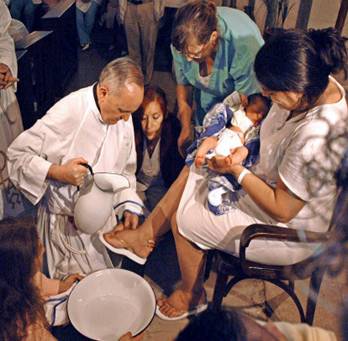We are in the middle of Holy Week,
and tomorrow, Holy Thursday, we celebrate the Mass of the Lord’s Supper,
remembering that first occasion when the Paschal meal was shared by the Lord
with those gathered in the Upper Room. Here in a community meal he showed us his way of giving thanks to the
Father - 'eucharist' - and assured us that sharing in this meal was a
participation in his life, death, and resurrection - and that it would be the
food that would give us strength for our journey of discipleship.
An ominous day in many ways, those
last hours before the walk to
Gethsemane
, out across the Kedron
River, yet a time of true significance.
We are also
told that he knelt and washed the feet of those who shared the meal with him.
This ritual of washing feet made its modern appearance with the reform of the
Easter Liturgy in 1956.
It had not
been seen since the Middle Ages.
From the
time when Canons of the cathedral washed the feet of beggars, through to the
substitution of a gift of money instead of washing (still preserved in the UK
when the sovereign hands out the “Maundy Money” to pensioners, their
number matching the years of her reign) to the Rite we now use on Holy
Thursday, our appreciation of this action has become somewhat blurred.
The
Washing of Feet is an action of gentle kindness, an act of service and an
intimate act of love. I received this email recently from a member of the Call
to Action group here in
UK
. I think is says so much about what should be our real
understanding of the Lord’s gesture.
“I
took part in a retreat lead by Jean Vanier at Trosly last October. He is
an inspiration. In his book: Becoming
Human, which I recommend, he says: "Community
life with men and women who have intellectual disabilities has taught me a
great deal about what it means to be human."
Towards
the end of the retreat we sat in small circles of
about eight people and washed the feet of the person next to us. As it worked
out
the youngest person at the retreat had her feet washed by Jean. It was a
beautiful ceremony. Jean based the retreat on John's gospel”.
This
was not a pre-selected group of men, but a gathering of those who had shared
community with each other, women and men, young and old. Unfortunately our
translation of “viri” has led us to understand that
this action is restricted to a re-enactment of Jesus washing the feet
of the twelve, rather than a significant sign of love within a community. The
heading photograph of Papa Francesco when he was Archbishop in
Buenos Aires
is direct and offers a fine example of inclusive love. The
rejection of women from such an occasion could be seen as hurtful, another
exclusion from the life of the Church, where the actions of men dominate. Tom
O’Loughlin (details are quoted below) goes so far as to say “…if it is a
choice between excluding women and dropping the action, then it is better to
drop the event lest it be a counter-symbol”
That
would be a pity. Maybe another instance where we have to think through the
significance of our gestures within the context of our appreciation of gender
issues.
For a fuller exposition of the understanding of footwashing
see
·
O’LOUGHLIN, T., 2013. Cel
Celebrating the New Commandment: Footwashing and our Theology of Liturgy
Scripture in Church.
43(169), 118-127
Tom
O’Loughlin is professor of Historical Theology at the University of
Nottingham, England
http://www.nottingham.ac.uk/theology/people/thomas.oloughlin
